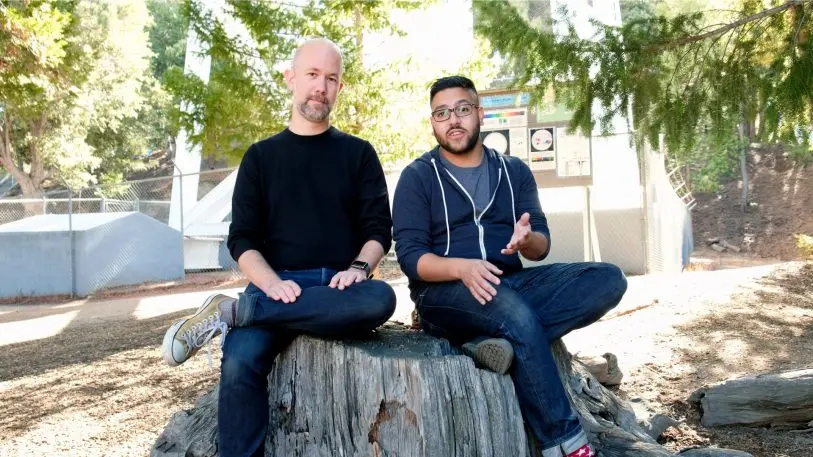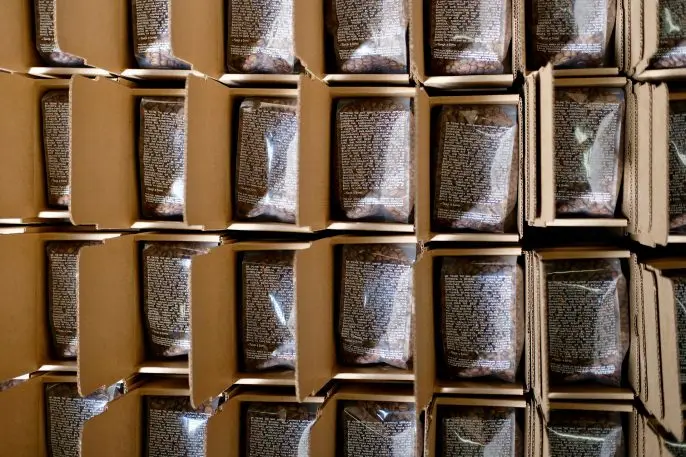Coffee roaster Tony Konecny, better known by his nickname Tonx, had his first run at a mail-order, subscription-based coffee service play out in a way most people would see as success. Three years after its founding, his angel- and seed-stage-funded startup, Tonx Coffee, was bought out by Blue Bottle Coffee, which itself got gobbled up by Nestlé in 2017. At the time of its acquisition, the company was doing several million in annual sales and had been talking to venture-capital firms about a Series A investment.
Now Konecny is gearing up for his second pass at mail-order coffee. His new outing, Yes Plz, still focuses on sourcing green beans from growers and roasting them to demanding specifications in his own roasting equipment with his business partner, Sumi Ali. However, instead of Tonx Coffee’s exclusive single-origin coffee–a term defining anything from one harvest on a particular field on a farm up to a regional cooperative’s collectively processed output–Yes Plz will will offer a blend of several high-quality beans. Konecny says this will let the company better shape flavor and manage inventory and growth, while also discouraging what he thinks can be an excessive focus on provenance and wine-review-like sobriquets among coffee purists. Rather than offer just an every-other-week subscription with automatic renewals, the new operation will also offer one-off purchases and varying schedules and amounts.

The plan is to charge $15 for a 12-ounce bag of whole beans including shipping. That’s within a buck or two either way of an in-store price for a high-quality blend, and roughly $2 to $7 less than via mail-order from potential competitors like Stumptown, which charges $22 for delivering a single bag of its classic blend, or $20 as part of an every-other-week subscription. Blue Bottle charges the same subscription price for its blends.
“We’re intentionally pricing the coffee in such a way that we’re not going to have the margins to turn this into a Warby Parker,” Konecny says. There’s a method to these margins: it locks out inflated expectations by any potential future investor, while also giving Yes Plz an edge over competitors who offer the same quality of coffee. With lower costs and expectations of return, the company may be able to counter the advantages larger companies will have with marketing budgets and volume.
Yes Plz is also launching its mail-order service on Kickstarter. It doesn’t need the money to start up operations, which have been in place for over a year. Rather, it’s using crowdfunding to gauge demand and help determine pricing, an increasingly common tactic for largely self-funded companies which already have infrastructure in place.
It’s also a way for Konecny to start to rebuild the audience he gave up when he sold his earlier business.

Good to the last drop
Fundamentally, Konecny wants to break some aspects of the third-wave coffee movement, in which the beverage is treated more like wine than a commodity. Along with Nestlé-owned Blue Bottle, that movement includes chains such as Intelligentsia (for which Konecny helped set up a Los Angeles expansion several years ago) and Stumptown. It isn’t coincidence that with the third-wave rise, each of those formerly independent chains is now owned by one of two massive conglomerates: In 2015, JAB Holding Company’s Peet’s Coffee bought a majority ownership in Intelligentsia and purchased Stumptown.
Konecny believes that the focus on expensive machinery and sometimes laboratory-like precision on controlling variables, as well as trying to bring the floral, earthy, and other descriptors from wine tasting into coffee, distracts from sourcing and making a good cup. He doesn’t mind presentation in a coffee bar–“The theater of it matters!”–but he thinks the fussiness and snootiness has degraded the value of the beverage and has driven people away. With Yes Plz, he hopes to teach coffee fans not to worry so much about melodramatics.
His earlier subscription service, Tonx Coffee, had a lot in common with a small-scale tech startup. The company took outside investors in pre-Series A rounds with the intent of proving itself in stages and bringing in more capital. It was a heavy advertiser on tech podcasts and also placed ads on indie tech and design blogs with outsized influence.
By focusing on single-origin coffee and in-house roasting, the business capitalized on the growing tide of third-wave coffee. While other high-end mail-order coffee services already existed, most didn’t do their own roasting, instead reselling selections from others or outsourcing the work. Or they were relatively small operations aimed more at loyalty and service to customers than profit. Some offered menus of options, adding complexity and fulfillment cost.
Tonx Coffee changed up its beans every two weeks, and ultimately allowed people to order a bit more or less, but it always offered a single coffee at a time. It wasn’t a training course or intended to be challenging, but was more like a DJ gauging an audience and playing music toward the middle and sometimes at the edges.
The direct feedback from customers helped Konecny shape his choices and learn the problems people actually had with brewing coffee. “I felt like three months after we launched, I had more knowledge about what real home coffee consumers were doing in their kitchen than I think Intelligentsia had in more than a decade of operating coffee bars at that point,” he says.
Back in business
Although Tonx Coffee worked its way up to an annual run-rate of several million dollars, the continuous grind of a business that had to seek growth to raise funds to keep growing had sapped some of Konecny’s joy, he says. Then in November 2013, he had a brush with death when his gall bladder burst. He tried to work through the pain, until a local friend–who happened to be a nurse–called out of the blue, heard his symptoms, and drove him to an ER, where he had emergency surgery. (I’ve known Konecny since 2005, when I wrote about a café in Seattle that cut off Wi-Fi on the weekends. His lifesaver is a mutual friend.)
Konecny says that his abrupt, critical surgery and recovery didn’t create a thunderclap moment in his life, but “a week of heavy opiates was a sort of vacation from some of the low-level anxiety of the stress of the company.” A few weeks later, he and his co-founder started talking in earnest about an exit path, and the sale to Blue Bottle came just months later. He stayed with the acquired company for about seven months, until the Tonx Coffee brand was retired.
While he wasn’t ready to get sucked back into roasting, and had a non-compete agreement with certain restrictions from Blue Bottle, he was swayed by regular coffeeshop conversations with Roy Choi, a chef friend. Choi and Daniel Patterson, another well-known chef and restaurateur, are founders of LocoL, a chain of fast-food restaurants dedicated to healthy and sustainably grown food in underserved communities.
LocoL wanted a solid $1 cup of coffee, and Konecny delivered it by co-founding Yes Plz with Sumi Ali, who had trained to roast at Tonx Coffee. They worked out a hybrid plan in which leftover hot-brewed coffee would be decanted before it went stale, and mixed with a cold-brew concentrate to form a new drink sold in the stores. This recovered otherwise lost coffee, making the pricing work.
LocoL’s initial food concept didn’t prove as successful as the chefs behind it had hoped, and it’s since retooled its menu and closed some locations, and its partnership with Yes Plz ended. But with a roastery set up, Konecny and Ali had already begun plans for their next phase.
The use of a blend instead of shipping single origins may be more controversial than anything else Yes Plz is doing, even though it’s common at third-wave shops. Blends are typically looked down upon as lacking provenance in the current elevated coffee discussions, but Konecny notes that as a mostly self-trained roaster–he got his start when he was more or less handed the keys to a shop’s equipment about 15 years ago–he thinks they’re highly underrated. And he’s not purchasing anonymous coffees from distributors to mix together, but sourcing directly and blending varying costs of coffee as well as their actual taste. He can see a point in the future where Yes Plz might buy an expensive single-origin and sell 20 percent of it to subsidize mixing the other 80 percent into its main blend.
From Blogger To Beans
Yes Plz has another tool at its disposal, which is Konecny’s nickname turned brand name. Konecny is pronounced koh-NESS-knee, and his moniker Tonx predates not just Tonx Coffee, but the Harry Potter books’ beloved Tonks. Before Tonx Coffee, Konecny was a popular coffee blogger, among the first, and developed a crusty reputation as someone who debunked the hand-waving and fetishism that had already accrued to third-wave coffee. “The reality is if the roaster got those beans right, you can use a shitty blade grinder and your mom’s dirty coffee machine and the results will be pretty stellar,” he says.
But having spent 2011 to 2014 successfully embedding his Tonx brand in the minds of blog readers and podcast listeners, Konecny is likely the only individual roaster anyone who isn’t a coffee superfan can name. That branding was intentional, to put a real person behind the coffee, and it should pay off now that he’s back, even though the business has a different name. Articles in The New York Times and elsewhere in April 2017 about the LocoL partnership helped reinforce that.
Konecny doesn’t picture Yes Plz as a David fighting Goliaths. He’s unconcerned about billion-dollar firms with deep pockets and extensive portfolios of brand names and retail outlets. He’s spending this time in this iteration building the coffee he wants for customers who appreciate it, and a business he and his partner can scale effectively while retaining ownership and control. “We’ve stepped on all the rakes with my previous business,” he says. “Maybe there will be some new rakes to step on.”
Recognize your brand’s excellence by applying to this year’s Brands That Matter Awards before the early-rate deadline, May 3.
